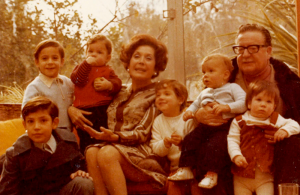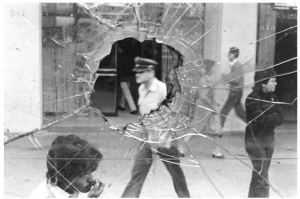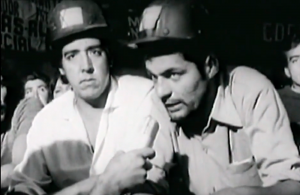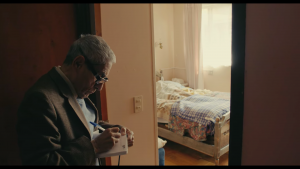By Diego Pino Anguita
Chile is a country where documentary filmmakers stand out. Some have been winning awards and participating at prestigious festivals and international markets for decades. Younger ones who are just beginning their adventure already enjoy success and recognition. Knowing this journey is essential to demonstrate the importance of the Chilean documentary audiovisual sector, one that already holds distinction beyond its borders.

Beyond my grandfather Allende | dir. Marcia Tambutti | prod. Paola Castillo y Martha Orozco
It is not new to say that the national film industry has a documentary heritage since the beginning of its history, and working with the materials given by reality has provided the experimentation, innovation and social connection for the Chilean cinema. For the same reason, and with the documentary making history again with The Mole Agent, nominated for Best Documentary at the Academy Awards, we wanted to remember how non-fiction has always been opening up paths for Chilean cinema.
From its beginnings, the documentary will try to observe and film different moments of daily and social life, endowing them with a patrimonial power and memory, fundamental at the minute of reviewing today’s history. Thanks to the work of those who protect our heritage, we have knowledge that the first film archive in Chile was a documentary and it happened 124 years ago, with A cueca in Cavancha .
Next there will be other historical archives such as the funerals of Pedro Montt or Luis Emilio Recabarren; the opening of the Viña del Mar casino or different military and civic acts. By then, the documentary resolves to go along with a story. From Edmundo Urrutia’s El Corazón de una Nación (1928), to the unthinkable feat of the Jesuit priest Alberto María de Angostini who in 1933 gave us unseen footage in Tierras magallánicas, to the impeccable journalism work that Naún Kramarenco has been doing since 1945. It is not, in my opinion, until 1955 that the pair, Armando Parot and Fernando Balmaceda, present us footage with more political regards and transforms the documentary in a fundamental tool to expose a reality endowed with narrative and point of view. This marks the beginning of a period in which it becomes a key ally in the country’s production processes. Petróleo Chileno (1955), for example, tells the story and procedure of «black gold» with an impeccable cinematographic narrative.

The Cordillera of the Dreams | dir. Patricio Guzmán | prod.
Renate Sachse
Meanwhile, in the late 1950s, a group of amateur filmmakers, called to narrative, cinematographic and visual experimentation to portray the social reality of the people and workers’ movements, exploited the genre, impacting at a national and international scale: the filmmakers of the Experimental Center of the University of Chile with their precise works burst onto the world scene.
In 1957, Sergio Bravo’s Mimbre won its first international award at the Ottawa Film sur l’Art Festival. Later, in 1958, the beautiful duo of Jorge di Lauro and Nieves Yankovic won the Santa Margarita de Liguria Award with Andacollo at the Genova Latin American Film Festival. In those years it is worth mentioning the tireless work of Sergio Bravo, who in 1961 took the Chilean documentary to the prestigious Locarno Film Festival with Láminas de Almahue, winning an honorary diploma for his expressive work. Another impressive pair, composed by Héctor Ríos and Pedro Chaskel, will then surprise with Aquí vivieron (1964), premiered at the great Venice Film Festival. It is worth mentioning the joint work between France and Chile, for the production A Valparíso, directed by Joris Ivens, written by Chris Marker, and the assistance director Sergio Bravo and the assistant cameraman Patricio Guzmán. Perhaps the first international co-production in Chile to win awards in Leipzig, Oberhausen and Prades.
Already in the 1970s, the Chilean documentary began to dialogue with artistic expressions and professionals at an international level. In 1961, the documentary Creative Hands obtained an honorable mention at the Karlovy Vary International Film Festival and, in 1965, by Fernando Balmaceda, the Tejidos Chilenos was presented at the Moscow Festival. Years later, other productions brought with them the first screenings and presentations of Chilean documentaries on European public channels in Poland, Russia, Switzerland and France. The path of internationalization was already open.

Gaucho Americano | dir. Nicolás Molina | prod.Joséphine Schroeder
In 1970, three Chilean documentaries triumph in West Germany: Desnutrición Infantil and Brigada Ramona Parra, both by Álvaro Ramírez; and Venceremos, by Pedro Chaskel, would win the Fipresci Award at DOK Leipzig, festival attended by a Chilean delegation whose goal will be to strengthen ties with East Germany. However, it is Venceremos, a masterpiece of dialectics, which one year later achieved the first appearance of the Chilean documentary in the Directors’ Fortnight in Cannes, that is, five decades ago.
Meanwhile in Chile, in 1967, filmmakers led by Aldo Francia, started the first Viña del Mar Film Festival, a fundamental meeting event for all of Latin America, where cinema will be thought of as a tool for social change. Thanks to this space, later on, will also be born the beautiful manifesto of the Chilean filmmakers of the Unidad Popular (Popular Unity), which in one of its sections states: «That Chilean cinema, by historical imperative, should be a revolutionary art» lines that will soak the documentary in the coming years. It is also so, as from the political impact and experimentation, a symbolic film of the experimental Cinema of the University of Chile, Descomedidos y Chascones in 1973, by Carlos Flores del Pino, will premiere in Venezuela, Cuba and Spain.
The works of Pedro Chaskel, Héctor Ríos, Miguel Littin, Raúl Ruiz, José Román, Fernando Balmaceda, Armando Parot, Patricio Kaulen, Patricio Guzmán, among other male directors, stand out nationally and internationally. However, in 1972, following the paths of Nieves Yankovic, the architect and director Marilú Mallet with her work Amuhuelai-mi will break into the cinematography scene. Followed by Valeria Sarmiento and Carmen Duque, they will begin to change the balance around the leadership that women have in the Chilean documentary to this day.

La flaca alejandra | dir. Carmen Castillo y Guy Girard | prod.
Days before the coup d’état, Patricio Guzmán will release his documentary The First Year (1971) at the Mannheim Festival in Germany, an event that to this day follows Chilean cinema very closely. But when democracy is violently interrupted, and as artists and filmmakers are persecuted, the cameras must be turned off and, on many occasions, go abroad, not before having filmed with strength the social process that Chile lived, and that no fiction could overcome.
This is how The Battle of Chile, by Patricio Guzmán, with its three parts, will tell the world, before any history book, what happened in the country, becoming over the years the Chilean film that has been touring around the world the most, translated into more than fifteen languages, and participating in countless international festivals and retrospectives. His heroic deed not only captures the process, but rescues the footage material at the expense of the lives of the filmmakers themselves, in a new breakthrough that the documentary gives to the world. Because of its historical and political importance, and its journey over time, is that The Battle of Chile (1973-1976) in our humblest opinion, is the most important film in the history of our country to date.
From exile or clandestinity, other filmmakers will continue to tell the history of the country from the images. Here we highlight Orlando Lubbert’s Los puños al frente del cañón (1979), which won the Best Documentary Award at the Havana Latin American Film Festival; Chile y su verdad (1977) by Aliro Rojas Vilch; or Recado de Chile, by Carlos Flores and José Román, which will participate in the Lille Documentary and Short Film Festival in France and will receive a special mention at the New Latin American Film Festival in Havana.

The Other Day | dir. Ignacio Agüero | prod. Daniela Salazar Ignacio Agüero y Christian Aspée
In the midst of the Chilean «cultural blackout,» and facing the need to find new ways to tell stories with the materials of reality, the documentary cannot turn a blind eye to what it was happening. Under the pseudonym of Pedro Meneses, in 1984, a young Ignacio Agüero will present No Olvidar, a film that tells of the tragedy of the transgression to the human rights in Chile and of his relatives. The documentary can fortunately bring that story to the world and is presented at the Bilbao International Documentary and Short Film Festival and gets a special mention at the Havana Latin American Film Festival. Then in 1988, Agüero breaks in with Cien niños esperando un tren, a fundamental film of Chilean cinema, which is also open to thinking about portraying social change from another perspective. This work again clears the way to other latitudes, being awarded as Best Documentary at the Latin Film Festival in New York, with the OCIC award at the Cartagena de Indias Film Festival and celebrated at the Havana Film Festival, event that was already transforming into a great exhibition turf for Chilean cinema.
Meanwhile, Patricio Guzmán from France offers another perspective of the Chilean dictatorship with En nombre de Dios (1987), a film that gives an account of the role that the Catholic Church and the creation of the Vicariate of Solidarity played in the struggle for human rights and against the Pinochet dictatorship, winning the Grand Prize at the Festival dei Popoli in Italy.

The City of Photographers | dir. Sebastián Moreno | prod. Claudia Barril y Viviana Erpel
During democracy, the cameras seem to come back on, and so did the screening windows to the world. In 1994, in Havana, a young Carmen Castillo presents La Flaca Alejandra. A year before, Ignacio Agüero, follows an iceberg to Seville in his poetic film Ice Dreams. And again, it will be Patricio Guzman who in 1997 with Chile, The stubborn memory, opens more distant borders, achieving the audience award at the Marseille Film Festival, event where Chilean films continue to be watched with close attention. With this work he arrives at the prestigious Canadian documentary festival Hot Docs and wins the Grand Prize at the DocAviv Film Festival in Israel.
That same year, with the support of documentary filmmakers who were starting to group together, the first edition of the Santiago International Documentary Festival begins, FIDOCS, one of the oldest in Chile, which already has 23 years, and that long before others, was presented as a cinema meeting event, becoming a great achievement for Chilean cinema. Later, in 2000, the Association of Documentary Filmmakers of Chile, ADOC was born, a trade union that brings together filmmakers from the sector not only to socialize and discuss experiences, but also to improve the conditions of the sector.
In the first decade of the new century, already with a lukewarm National Fund (FONDART) that allows the financing of some documentaries, important productions appear that will begin to travel the world. In 2000, Esteban Larraín premiered Ralco at the Gijón Film Festival, again bringing up the Chilean social reality. In 2001 La última huella, Paola Castillo’s debut film, rescues the memory of the last Yaganes and manages to reach the Berlin Film Festival, in the Panorama section, becoming a turning point of what, even today, we see in that festival. In 2002 Estadio Nacional by Carmen Luz Parot, premiered at the Malaga Film Festival, where every year Chilean films go by today. And once again, thanks to Patricio Guzmán, the Chilean documentary returns to Cannes with El caso Pinochet, which in 2001 took part in the Semaine de la Critique of the festival and won the Grand Prize at the Marseille Film Festival.

Lemebel | dir. Joana Reposi | prod. Paula Saenz-Laguna
Since then, it is not uncommon to see Chilean filmmakers break into prestigious world film festivals. In 2001 Cristián Leighton won the Best Documentary Award at the New York Independent Film Festival with Nema Problema. That same year, Marcela Said surprised with I love Pinochet, a documentary that shows with subtle sarcasm the Pinochet phenomenon after the arrest of Augusto Pinochet in London. In 2002, filmmakers Bettina Perut and Ivan Osnovikoff premiered A Man Aside at the most important documentary film festival in the world: Amsterdam International Documentary Film Festival, IDFA. In the same year, Raúl Ruiz himself landed with his series Cofralandes, which won the Fipresci Award and the Glauber Rocha Award for Best Film at the Montreal Film Festival. Even, from regional places, begins to produce and will surprise Antofagasta, the Hollywood of Latin America, by the avant-garde Adriana Zunic, which obtains awards in the United States and Latin America, while in 2004, Carlos Klein makes his way to the renowned Swiss festival Visions du Réel with his film Tierra de agua.
Patricio Guzmán’s persistent work once again takes the Chilean documentary to Cannes with Salvador Allende (2004) who will have an out-of-competition screening. The following year, Chile began to attend regularly at IDFA and the film The City of Photographers, directed by Sebastián Moreno, is part of the official competition. In 2005, David Abala premiered his Perspecplejia in Guadalajara, obtaining a special mention. In a more experimental front, in 2006, Cristóbal Vicente premiered Arcana at Cinéma du Réel and won awards in Portugal, Spain, Germany and Belgium, among others. Finally, in 2007, it will not be Patricio Guzmán who returns to Cannes, but rather an experienced filmmaker, Carmen Castillo, who from France will present her courageous work Calle Santa Fe, in the section a ‘Un Certain Regard’.
From then on, the presence of the documentary at festivals will be overwhelming, which will also be replicated in the markets of the audiovisual industry. In 2008 Paola Castillo and Tiziana Panizza will participate for the first time in the Forum of the Hot Docs Film Festival in Canada, with their film 74m2, which will later become the first co-production with the United States public television. In 2011 an emerging Maite Alberdi will participate with her developing film, The Lifeguard, in Pitching du Réel in Switzerland; and in DocMontevideo, Marcia Tambutti, presents Beyond my grandfather Allende in the Pitch Central.

Malqueridas | dir. Tana Gilbert | prod. Paola Castillo
In parallel in Chile, in 2007 Docs Santiago was initiated, a space for the presentation of projects in development to the national industry. Nine years later, Conecta, the first international documentary industry market, will conitnue to do so. Another important milestone in Chile is the documentary Ojos rojos, directed by Juan Ignacio Sabatini, Juan Pablo Sallato and Ismael Larraín, a film that in 2010 became the most watched documentary of Chilean cinema with more than 125,000 spectators in theatres.
It is no coincidence that the Chilean Documentary Corporation CCDoc, then called Chiledoc, was born that same year in order to support the commercialization and distribution of the Chilean documentary. Since that time, the organization has made it possible to open up spaces for the training and experience of executive producers, the distribution of documentary films in cinemas in Chile, the creation of an international documentary market in the country, the organization of more than 35 official delegations to festivals and markets around the world and the consolidation of a collaborative and active community around the specificity of the documentary.
From 2008 to date, the Chilean documentary has been represented year after year at the most important film festivals in the world, highlighting among many others: The Chilean Building (Macarena Aguiló, 2010, Dok Leipzig); News (Bettina Perut & Iván Osnovikoff, 2009, IDFA); Nostalgia for the light (Patricio Guzmán, 2010, Cannes); The Lifeguard (Maite Alberdi, 2011, IDFA); The Young Butler (Marcela Said, 2011, Berlinale); Hija (María Paz González, 2011, Thessaloniki), The Last Station (Catalina Vergara & Cristián Soto, 2011, Dok Leipzig); The Other Day (Ignacio Agüero, 2011, FICG); Propaganda (Colectivo MAFI, 2014, Visions du Réel), Tea Time (Maite Alberdi, 2014, IDFA); The Beavers (Antonio Luco & Nicolás Molina, 2014, Sheffield Doc/Fest); Chicago Boys (Carola Fuentes & Rafael Valdeavellano, 2015, Edimburgo); The wind knows I’m coming back home (José Luis Torres Leiva, 2016, Rotterdam), Cielo (Alison McAlpine, 2018, Hot Docs), Petit Frere (Roberto Collío & Rodrigo Robledo, 2018, Visions du Réel), Las cruces (Teresa Arredondo & Carlos Vásquez, 2018, FidMarseille), Flow (Nicolas Molina, 2018, Sheffield Doc/Fest), Living There Is Not Hell, It Is the Fire of the Desert. The Plenitude of Life That Stayed There Like a Tree (Javiera Véliz, 2018, Cinéma du Réel); The Dreams of the Castle (René Ballesteros, 2019, Cinéma du Réel); The Kings (Bettina Perut e Iván Osnovikoff, 2019 IDFA); The Grown-ups (Maite Alberdi, 2016, IDFA); God (Collective MAFI, 2019, Dok Leipzig); El Gurú (Rory Barrientos, 2019, Visions du Réel); Story of my name (Karin Kuyul, 2019, Rotterdam); just to name a few.

Chicago Boys | dir. y prod. Carola Fuentes y Rafael Valdeavellano
It is important to underline that not only has the documentary provoked internationally as a feature film format, but as in other formats as well, for example, MAFI.tv, which in 2012 was selected at DocuLab IDFA; Quipu project, by María Ignacia Court and Rosemarie Lerner, premiered at Hot Docs, Sheffield Doc/Fest and IDFA in 2015; and more recently, Symbiotica, by Natalia Cabrera, Juan Ferrer and Sebastián González, selected at Dok Leipzig and CPH DOX.
Among the many Chilean short films that have led oficial selections and screenings are, and just to name a few: White Death (Roberto Collío, Locarno); SNAP ( Ananké Pereira and Felipe Elgueta, Sheffield Doc Fest), City Plaza Hotel (Violeta Paus, Berlinale); Lettres a la administration (José Jiménez, FICCI); Riña de gatos (Jairo Boisier, Visions du Réel); I’m still here (Tana Gilbert, Hot Docs); Maria K (Juan Francisco González, Cinéma Du Réel); Siluetas de agua (Violeta Paus, Dok Leipzig) and I’m not from here, by Maite Alberdi and Giedrė Žickytė, premiered at Visions du Réel and awarded at countless festivals.
In parallel, the same Alberdi, had premiered Tea Time at IDFA in 2014, winning the award for best female documentary direction by the circle of women film journalists and achieving a new historical breakthrough: the nomination for a Chilean documentary in the category Best Ibero-American Film at the Goya Awards.
The latest milestones of documentary have installed us in the most important film festivals in the world. Thus, in 2015, Marcia Tambutti, would achieve her world premiere in the Directors’ Fortnight of Cannes, with her film Beyond my grandfather Allende that, in addition, would be the first film in history to win the newly inaugurated Award «The Golden Eye» for best documentary in all sections of the Cannes Film Festival and its parallel competitions. That same year, the Silver Bear Award for Best Screenplay for the film The Pearl Button by Patricio Guzmán was awarded at the Berlinale, a turf opened for Chile and the documentary with big premieres, since the next few years in the Panorama section Adriana’s Pact by Lisette Orozco (Peace Film Award) and Lemebel by Joanna Reposi (Teddy Award) would be screening and competing as well. Both films managed to tour a series of festivals around the world, achieving an echo rarely appreciated before. And in 2020, The Mole Agent would become the first Chilean documentary premiering at the Sundance Film Festival.

The Battle of Chile I | dir. Patricio Guzmán | prod. Chris Marker
In addition, since 2011 to date, important and historic Chilean and Latin American focus events have been held where national films were included as well, these were held at the festivals of Dok Leipzig, Visions du Réel, Yamagata Film Festival, the Iran Documentary Film Festival, the Santiago Álvarez Film Festival, and a historical exhibition with more than seventy screenings and forty Chilean documentary films of all time at the world-famous Centre Pompidou in Paris. Chile has also been present at key events such as Cannes Docs de Marché du Film (Cannes) with its own Chilean Showcase; or at DocSalon of the European Film Market (Berlinale), and has consolidated its participation in other markets that are sometimes not so mentioned, but fundamental to internationalization as they are in the United States (Sundance), Colombia (BAM), China (CCDF), Hong Kong (FILMART), France (Sunny Side of the Doc), Brazil (DocSP, Brazil Cine Mundi), Uruguay (DocMontevideo) and Mexico (DocsMX), among others, expanding in an unprecedented way the networks of the sector worldwide.
In the past two years, Chilean documentarians have excelled in numerous film festivals, international markets and broadcasters, digital platforms, immersive exhibitions, art galleries and innovation catalogues. International co-productions with countries such as Canada, France, the Netherlands, United States, Colombia and Argentina, among others, have paid off. Several documentaries have continued to expand territories. To name but a few: The Space Journey (Carlos Araya, Sheffied Doc Fest); Night Shot (Carolina Moscoso, FidMarseille); The Journey of Monalisa (Nicole Costa, DocNYC); The other one (Francisco Bermejo, Visions du Réel); El Negro (Sergio Castro, Toulouse); The sky is red (Francina Carbonell, IDFA); The Cordillera of Dreams (Patricio Guzmán, Cannes).
Without a doubt, the path widely known by the Chilean documentary reaches its greatest peak today, when the genius and talent of director Maite Alberdi, and the whole team behind The Mole Agent, install it, in a historic milestone, as part of the nominees for Best Documentary at the Academy Awards in Hollywood. Behind it, an endearing film and a clear strategy to conquer the American market, with a premiere at the Sundance Film Festival and, subsequently, at the most important documentary festivals in that country, in addition to its premiere on public television in the United States PBS, the oldest slot for independent non-fiction films; on Hulu, massive platform in the country of the north; and later on Netflix, one of the most important digital platforms of the world. In parallel, her nomination for Best Ibero-American Film at the Goya Awards and for Best Foreign Film at the Spirit Awards further enhance this path.

The Mole Agent | dir. Maite Alberdi | prod. Marcela Santibáñez
The Mole Agent is the only Latin American film nominated in the current edition of the Academy Awards, it’s the first nomination for a female director in Chile and the first Chilean documentary nominated for these award. Like its ancestors and other outstanding national documentaries of which we have reviewed history, this film opens up unthinkable paths for future filmmakers and audiovisual professionals.
For the documentary, with the passing of years, to gain more and more recognition in the international audiovisual industry, it is not only legitimate for its particular way of filming reality, or because it is a long known genre for us, but because it also contains a cinematographic value impossible to calculate. It is quite a relevant landmark when the challenge today is to find recognition of the productions in our own country. «It’s always a test for the documentary filmmaker to defend documentaries as films, and I think this is an achievement for us» said Maite Alberdi when she heard about her Documentary Oscar Award nomitation, because any recognition of this genre is arduous, and has thus become evident. However, beyond this difficulty, the Chilean documentary has managed to settle within the national and international audiovisual industry, and position itself as a great exponent, occupying the place it deserves and always opening doors for the filmmakers who will come.
Bibliography:
– Vega, A. 2006. Itinerario del Cine Documental Chileno. Santiago. Universidad Alberto Hurtado
– Guevara, A y Gárces, R. 2007 Los años de la ira. La Habana. Nuevo Cine Latinoamericano.
– Mouesca, J. 2005. El Documental Chileno. Santiago. LOM
– Mouesca, J y Orellana, C. 2010. Breve historia del cine chileno. Santiago. LOM
– Balmaceda, F. 2002. De zorros, amores y palomas, memorias. Santiago. Aguilar chilena de ediciones.